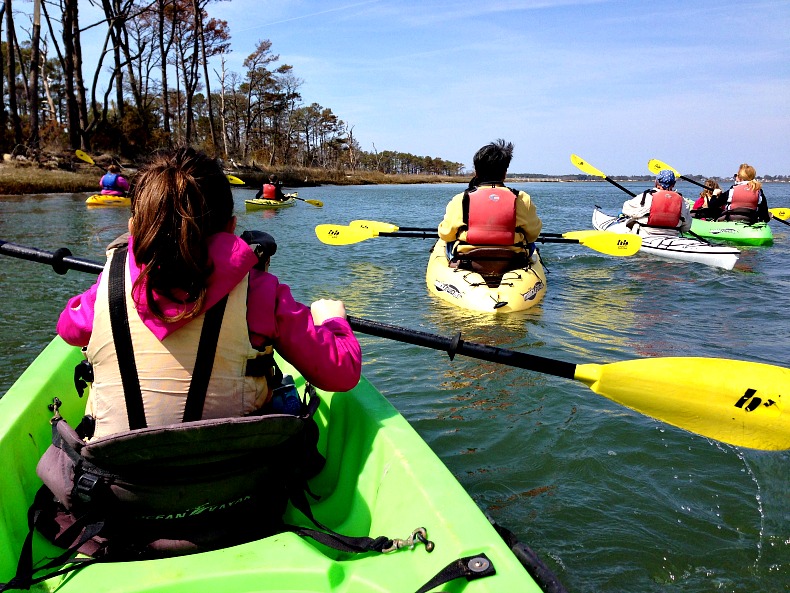In a previous post, I talked about the importance of providing just the right amount of challenge. I made it sound so easy. It’s not. Kids respond in different ways to being challenged, and the ways they respond can drive a parent’s response. Below is a story that is a metaphor for raising kids who have very different responses to being challenged.
Last week, we were on vacation and went kayaking. My husband was at a conference, so I took my boys by myself. We have been kayaking as a family a number of times before, but always with two of us in each kayak – one adult and one child.
My oldest was worried about kayaking on his own, but there was no one else on our tour who was able to partner with him, so he had to figure out how to do it by himself (with help from the tour guide). He did a fantastic job; he kept up with the guide, controlled his kayak, and did well. At the end he felt good about the trip and his abilities.
That was not the case for my youngest, who was in a two-person kayak with me. Kayaking on the ocean, against the wind and tide which were pulling us strongly back to the shore, was a lot of work. My youngest has increasingly been unable to push himself to do things that are hard, and kayaking that day was hard work! So he would dip his paddle in, first on one side, then on the other. But he never actually pulled the paddles through the water so as to propel the kayak forward.
Mind you he is a teenager and now over 5 feet tall. When he was smaller and weighed less, it was easy enough to control the kayak with him in it. But I am no longer strong enough to maneuver and compensate for him. I was paddling as hard as I could to keep us from going backwards to the shore, and away from the group. I just couldn’t do it. About halfway into the tour, I realized that if we were going to have any hope of keeping up with the rest of the group, I had to move to the center of the kayak, and tell my son to quit paddling so my paddles wouldn’t hit his. This was the only way I could keep control of the kayak.
I was so grateful when the guide took pity on us and strapped a lead to our kayak to help us stay on track. With that assistance, and my more effective positioning, we were able to stay more or less with the group, even though my son was getting a free ride, doing no work at all.
It was a lot less frustrating, but I was exhausted, and worse, my son didn’t learn anything.
In the end, I regretted taking the trip, even though it was a wonderful tour. My youngest and I would have been much better off renting kayaks and dabbling around on our own in the marshes and along the shore, or working on paddle skills without the pressure of having to keep up with the rest of the group.
Later I realized that this was a good metaphor for what happens as we try to parent different kinds of kids. The kids who feel competent (even if they are scared) respond well to being challenged.
But there are other kids who are afraid of taking on challenges due to repeated failure, fear of failing, perfectionism, or some other challenge that has taught them that they will not succeed even when they try really hard. These kids can respond by becoming passive and increasingly hard to teach.
Our society demands that kids keep up, staying on a developmental track that allows them to function independently by the age of 18. If you have a child for whom that goal isn’t realistic, you may find yourself kayaking against the wind and tide, pulled farther and farther from the group.
Do you need help with your child? Sarah Wayland can help you figure out how to support your child via classes, Special Needs Care Navigation services, Parent Coaching, or as your certified Relationship Development Intervention (RDI) consultant.
Share this post on Pinterest!


